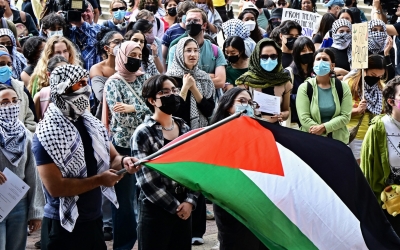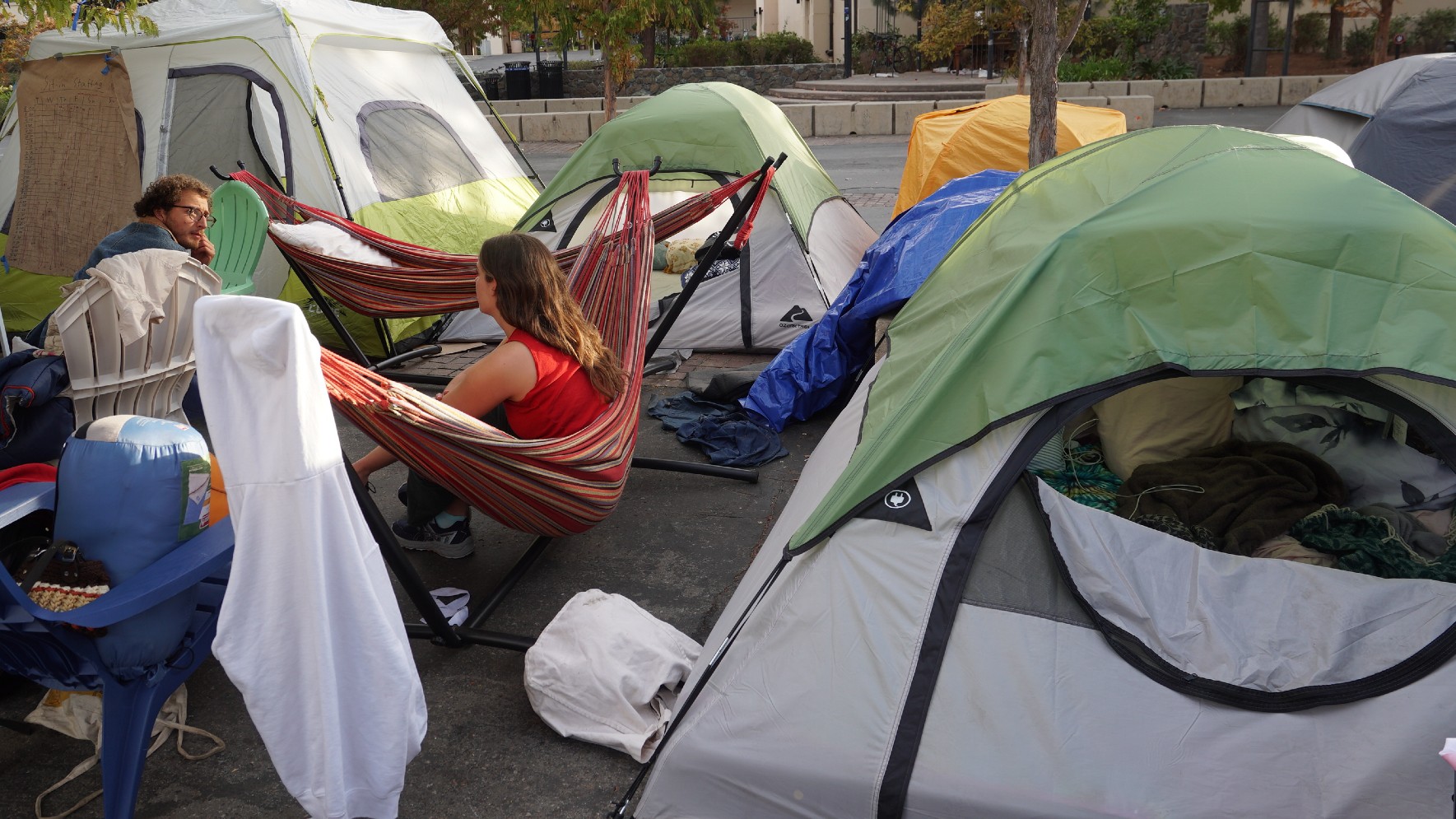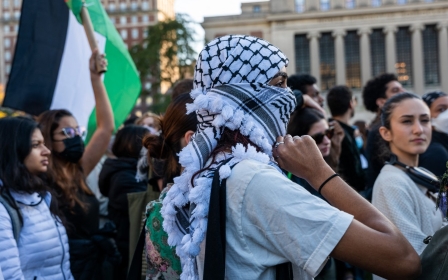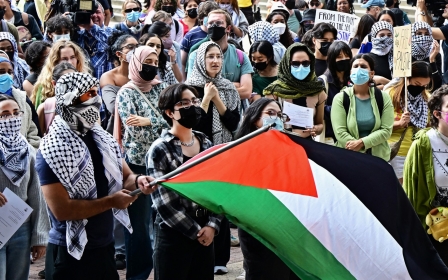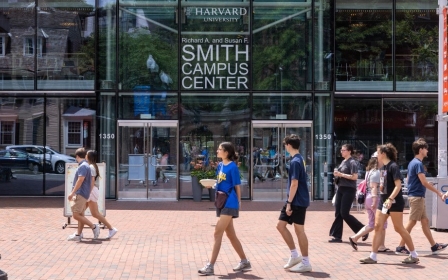Israel-Palestine war: Stanford students refuse to end Gaza sit-in until demands met

It started off with one person. Within hours it became a community.
For the past 27 days more than two dozen students at Stanford University have been staging a sleep-in protest in solidarity with Palestinians in Gaza who have faced weeks of relentless Israeli air strikes.
The students, made up of different nationalities and backgrounds, have been living in a small encampment made up of several tents in one of the main university quads.
Speaking to Middle East Eye on condition of anonymity due to fears of facing harsh reprisals for speaking out, the students said they would not end their sit-in until the university divested from and boycotted Israeli ventures and academic institutions, and condemned Israel over its occupation of the Palestinian territories.
Israel's latest assault on Gaza came after an attack by Hamas-led fighters on 7 October resulted in the deaths of around 1,200 Israelis, and around 240 taken as hostages.
New MEE newsletter: Jerusalem Dispatch
Sign up to get the latest insights and analysis on Israel-Palestine, alongside Turkey Unpacked and other MEE newsletters
Since then, more than 12,000 Palestinians have been killed, including close to 5,000 children by Israeli air strikes, according to Palestinian health officials. Around 1.6 million others have been displaced and face hunger, thirst and disease as a humanitarian catastrophe continues to unfold in Gaza.
The student who organised the Stanford sit-in told MEE that the protest was crucial in ensuring Gaza remained at the forefront of student and faculty members' minds.
"Stanford University has had many rallies in the past. Nothing came out of them largely because the university would ignore the demands of the students once the rally is over," the student, speaking on condition of anonymity, said.
"There have been multiple proposals written to the admin and all of them were shut down because there was no sustained follow-up by the students.
"We wanted to create a level of pressure that the university hadn't seen," the student added.
Follow Middle East Eye's live coverage of the Israel-Palestine war
Since Israel declared war on Gaza, around 50-60 students have spent their days at the sit-in. They usually arrive between classes, engage in discussions on Palestine and eat food provided by fellow students or community members.
As a thoroughfare between departments and offices at Stanford, hundreds of students pass by the site every day - on bicycles, on electric scooters or on foot - and inadvertently catch a glimpse of the incongruous camp.
'I received a threatening phone call saying that they know where I live'
- Palestinian student at Stanford
If they stop by or have a question, there are several volunteers ready to share information on their protest, point to a pamphlet on Zionism, a poster on colonialism, or a book on the history of Palestine.
The small encampment has not just become a platform of protest, it's become a means for students to re-educate themselves about colonialism and racism.
Around 20 students remain at the sleep-in overnight.
"The thing that unites people who are here is that we all feel that what is going on [in Gaza] is wrong and we feel we need to take a stand," Draper, a Jewish student who has been at the sleep-in from 20 October, told MEE.
"We need to push the university to do better."
The sit-in has also attracted members of Stanford's alumni. One former student, who also declined to offer her name, told MEE that as a Black American she wanted to demonstrate her support for the people of Palestine.
The alumna said she noticed the difference between the university's endorsement of the Black Lives Matter (BLM) movement was in stark contrast with their response to events unfolding in Gaza.
"BLM has become palatable for many people. For many people, their advocacy for BLM starts and ends with an exhibit," the alumna said referring to an exhibit at the Cecil H Green Library at Stanford, that documents the stories of close to 70 Black Americans who have been killed or impacted by police brutality and systemic racism.
"This is why we are here. We are saying that even Palestine is not palatable for you; we are going to be here and make sure you see what's going on there," they added.
Yusuf, another student who declined to offer his last name, said it felt as if Stanford had "issues with Palestinians".
The sit-in emerged as a petition that has garnered thousands of signatures and began circulating among the prestigious university's large student body and alumni network.
Stanford is one of several universities across the US where students have clashed with faculty members and administrators over their response to the war in Gaza and Israel's decades-long occupation of the Palestinian territories.
Since the war erupted, students have reported being abused by staff, who have accused them of anti-semitism and support for terrorism among other slurs.
Organisers of the sit-in said that since they launched their protest, administrators have only interacted with them on one occasion and have refused to commit to anything other than provide resources for Palestinian students.
Earlier this week, Stanford administrators said they would establish two groups aimed at combating hatred and providing community members with support. The first is a new subcommittee designed to combat antisemitism, while the other would be a newly established committee for Muslim, Arab and Palestinian communities that would be expected to address Islamophobia on the campus.
The initiative came more than a week after Abdulwahab Omira, an Arab student at Stanford, was hit by a car, in what is being described as a hate crime.
Omira said the driver screamed: "Fuck you and your people."
A preliminary investigation by the Santa Clara County Sheriff’s Office described it as a hate crime. The sheriff's office told MEE that the investigation was still ongoing, adding there were "no further updates at this time".
Stanford University's media office did not reply to MEE's request for comment.
Discrediting students across the US
Across the US, there has been a groundswell of support for Palestinians living under Israeli occupation, with student bodies issuing statements and engaging in several protest actions, much to the chagrin of university administrators, the Biden administration and the Israeli government.
Students who have espoused pro-Palestine positions or called for a ceasefire have been routinely described by administrators or pro-Israel students as terror sympathisers.
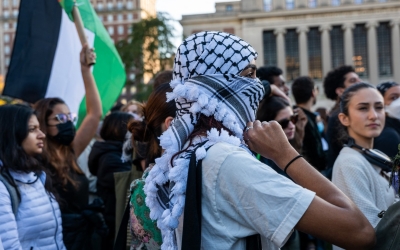
Several students have lost job opportunities or have had their identities plastered on blacklists on mobile LED screens outside the campuses, and online forums like The Canary Mission, which targets activists who speak out on Israeli crimes.
These actions have followed well-documented pressure exerted by billionaire donors and politicians to quell sentiment interpreted as anti-Israel.
Students noted that there has been a concerted effort to conflate pro-Palestinian advocacy with antisemitism.
This has helped create an environment in which university authorities have been accused of using antisemitism to discredit pro-Palestinian activism on campuses and inevitably characterise their advocacy as support for terrorism.
In Florida, the state university system was recently told to ban Students of Justice in Palestine (SJP) chapters across campuses in the state on the basis that students were providing "harmful support for terrorist groups".
At Columbia University in New York City, both the SJP and the local Jewish Voice for Peace (JVP) chapter were suspended until the end of the semester.
At a rally earlier this week at Columbia, one Jewish student who addressed protesters at the school said that the university's decision to suspend JVP, the only Jewish anti-Zionist group on campus, sent a chilling message to students that Judaism and the state of Israel was one and the same.
Columbia University did not reply to MEE's request for comment.
One Palestinian student at Stanford, who also requested anonymity, said that he found himself oscillating between feelings of horror at the images from Gaza on his phone and resentment towards the university administration for their refusal to condemn Israel.
On top of that, he said he was often distressed over the safety of his friends and colleagues who face being doxxed and harassed for speaking up for Palestine, or the potential harm of death threats.
"I received a threatening phone call saying that they know where I live," the Palestinian student said.
"So yes, being on campus has been sickening, but what has been helpful is the massive community support," the student said, alluding to the small village of tents and the community sitting behind him.
Where the lack of institutional support for Palestinians has failed, the student said that the sit-in had provided much-needed solidarity.
"In addition to this sit-in being a form of protest, it is a community. I come here to drink tea and coffee and talk to people," the Palestinian student said.
"They know what I am going through. And they allow me to be myself," the student added.
Middle East Eye delivers independent and unrivalled coverage and analysis of the Middle East, North Africa and beyond. To learn more about republishing this content and the associated fees, please fill out this form. More about MEE can be found here.



